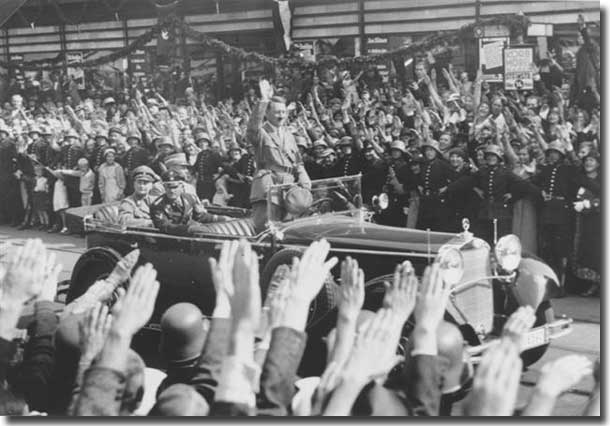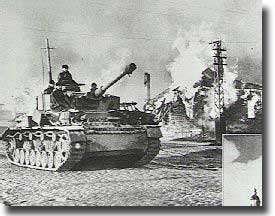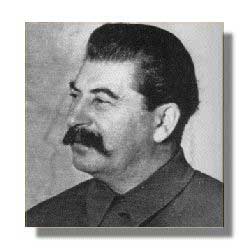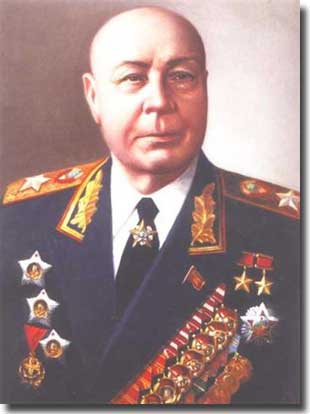|
Field Marshal Fedor von Bock ( 1880- 1945 )
He is reported as tall, thin, devoid of humour, arrogant, ambitious, and opinionated. No doubt these qualities, and great physical courage were all that was needed for him to move to the highest rank in his profession, many thought him capable without being brilliant. General Staff. WW1. Post WW1. Late in 1928 as a Major General, and but 48, he was given command of the 1st. Cavalry Division based in Frankfurt. In the 1930's von Bock continued up the military ladder, moving to command the 1st. Infantry Division in East Prussia, and promoted to Lieutenant General in 1931. Now in 1935 he became General of Infantry, to be in charge of Army Group 3 at Dresden for the next three years. This covered the period of Hitler's military growth, this command in 1935, had eight infantry divisions and three frontier commands. By October 1937, another three divisions had been added to Bock's strength, with more in the planning stages.
Bock a non Nazi. Invasion of Poland. He wrote a pessimistic memo to both the War Ministry and Hitler indicating in his view the British would land at Antwerp before he could take that port and the war would move to a long and difficult battle ranging over Belgium. Hitler was also not happy with the initial plans for the Western Front, and when the Manstein Plan ( to invade the Low Countries with Army Group B forcing the Allies to commit their reserves to that sector, then the main German forces could attack through the Ardennes and push to the Channel, this would cut off the main Allied forces ) was tabled, Hitler promptly agreed, it just happened to agree with his own initial thoughts and plan of action. Thus Bock's involvement was suddenly reduced to a secondary one, directing the 6th. and 18th, armies, they quickly overran Holland and Belgium, and took some 400,000 prisoners at Dunkirk. Now Bock controlled the 4th, 6th. and 9th, armies plus two Panzer Groups, and Western France was soon under German control. France capitulated, seeking an armistice. Bock was given the task of gurading the Atlantic coast from Brest to the Spanish border. Promotion to Field Marshal. The Field Marshal group was becoming a little crowded. Bock moves to the East. Russia. Now for the Russian invasion, Bock with 51 of the 149 German divisions committed to Operation Barbarossa had the job of taking Moscow. His forces captured Minsk, moved on to take Smolensk, Gomel, to advance 500 miles and be but 185 miles from the Russian capital. von Bock and his armies had performed well, inflicting 750,000 casualities on the Russians, capturing or destroying 7,000 tanks and over 6,000 guns, their own casualities, 100,000.
Hitler takes over. He had little alternative but to stop his offensive, and go on to be defensive in the Yelna Bend, but 47 miles east of Smolensk, with his remnants, the 9th. and 4th. armies. By now, the summer campaigning was drifting in the shorter days of autumn with a dreaded and threatening Russian Winter not far away. Although the road to Moscow was practically clear and beckoning, Bock had been denuded of his vital tanks, and was unable to exploit the position. Stalin reinforces the threatened area of the Yelna Bend.
Kiev falls to Germans. The double battle of Vyazma and Bryansk. The first snow fell on the 7th. of October, quickly melted and the Russian roads became rivers of mud. Almost all of Bock's mobility, a key to his success, was suddenly lost. Hitler at a crucial time sent off the 11 Air Corps and HQ, 2nd. Air Fleet off to Sicily. 2,000 German tanks stranded in the mud that was the unpaved Moscow highway. Bock's Luftwaffe also was grounded, he was only 70 miles out of the Russian capital, but had to halt until the 30th. of October for the freezing weather to harden the ground and allow food and ammunition to be brought up. Hitler wanted to call off the offensive, for once he was right in that judgement, but Bock's view to press on prevailed, so on the 15th. of November, Hitler ordered the final advance on Moscow. Freezing Temperatures. December 1. 1941. Stalin counter attacks. Bock was unwell with his ulcers giving him hell, and he unburdened himself to Hitler's personal adjutant, Colonel Rudolf Schmundt, imploring him to give the details to the Fuhrer. Two days later Field Marshal Keitel by telephone informed Bock that Hitler suggested he take extended leave to restore his health, a message which did not need repeating. Field Martial Guenther von Kluge relieved him the next day. Hitler was generous for once, telling Bock he did not hold him responsible for failing to take Moscow. New Appointment for Field Marshal von Bock. By mid January of 1942, Soviet Marshal Timoshenko was in full cry with his troops, and the German Army of seven divisions was up against thirty two Soviet infantry and cavalry divisions plus ten tank brigades. It was sheer exhaustion of the Russian forces and the deep snow that halted their offensive, rather than anything von Bock had managed to do. He began to build up his forces to counter attack the Izyum salient, whilst Timoshenko paused to rebuild and resume hostilities. Hitler planned a major offensive in this southern sector and ordered that Bock should receive priority in supplies and personnel.
May 1942. Bock struck against the southern flank of the Red Army advance, and halted them. By the 19th. of May, Timoshenko was counterattacking Kleist with vigour, the next day the German 6th. Army joined in, and on the 24th. of May, Paulus and Kleist linked up west of Izyum to trap the entire Soviet strike force, but few were to escape the German net. When this fight ended on the 29th. of May, Bock had captured 240,000 prisoners, 1,200 tanks and some 2,000 guns, to suffer only 20,000 casualities himself. Quite a victory. Still Hitler was unhappy with Bock's timidity before Kharkov. Hitler's Second Phase of a Summer offensive. Army Group South would then split in two, Army Group A, the 1st. Panzer and 17th. Armies, commanded by Field Marshal List, to cross the lower Don and take Rostov, then move South East to seize the Caucasus oilfields. Army Group B, 2nd. and 4th. Panzer, 6th.Armies plus the 2nd Hungarian Army, under Bock to cover List's northern flank and advance eastwards to the Volga. On the 28th.of June with a million men, Bock attacked, and the Russians quickly fell back, but the expected haul of POW's was not realised. Bock now sent the Hungarians off to fight at Voronezh, this caused several days delay, upsetting Hitler, and as Bock was also slow in sending off the 4th. PanzerArmy to the south, a large number of Soviet units escaped across the Don. Bock was worried about letting go of his armour until his left flank was secured by the Hungarians taking Voronezh, Hitler told him to break off the battle, but Bock ignored that order. Bock was overly concerned with securing his left flank, and openly critical of Hitler's plan calling for in his view, unreliable foreign Armies ( Hungarians, Rumanians and Italians ) to guard the flanks of his advance to the Volga, whilst Group Army A moved off to the south. Hitler had lost his faith in Bock, and on the 13th. of July, Keitel phoned to inform him his command was going to Colonel General von Weichs, Keitel also strongly advised the Field Marshal to ask to be relieved of his command on the grounds of illness.After some argument, Bock gave in. Hitler told Schmundt that whilst he still admired Bock, he could only work with his commanders who obeyed his orders to the letter. Bock went onto the Fuerher's Reserve on the 15th. of July never to be employed again. Post 1943. The Russians close in on Berlin. On the 4th. of May 1945, the war in Europe had but a week to run, on the Kiel road Bock's car was attacked by a British fighter-bomber, he was killed along with his wife and daughter. At age 64, Fedor von Bock became the only one of Hitler's Field Marshals to die from enemy fire. Conclusion. A capable commander, but neither brilliant nor a military genius, probably unlucky to lose his command in Russia, but he had tempted fate when he defied Hitler. return to index of "Adolf Hitler and his WW2 Field Marshals" |

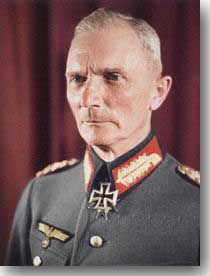 Born on the 3rd. of December 1880 in the province of Brandenberg at Kuestrin, the son of a Prussian General. He was thus destined for the Army which he entered in 1898 as a Second Lieutenant of the 5th. Prussian Foot Guards Regiment.
Born on the 3rd. of December 1880 in the province of Brandenberg at Kuestrin, the son of a Prussian General. He was thus destined for the Army which he entered in 1898 as a Second Lieutenant of the 5th. Prussian Foot Guards Regiment.